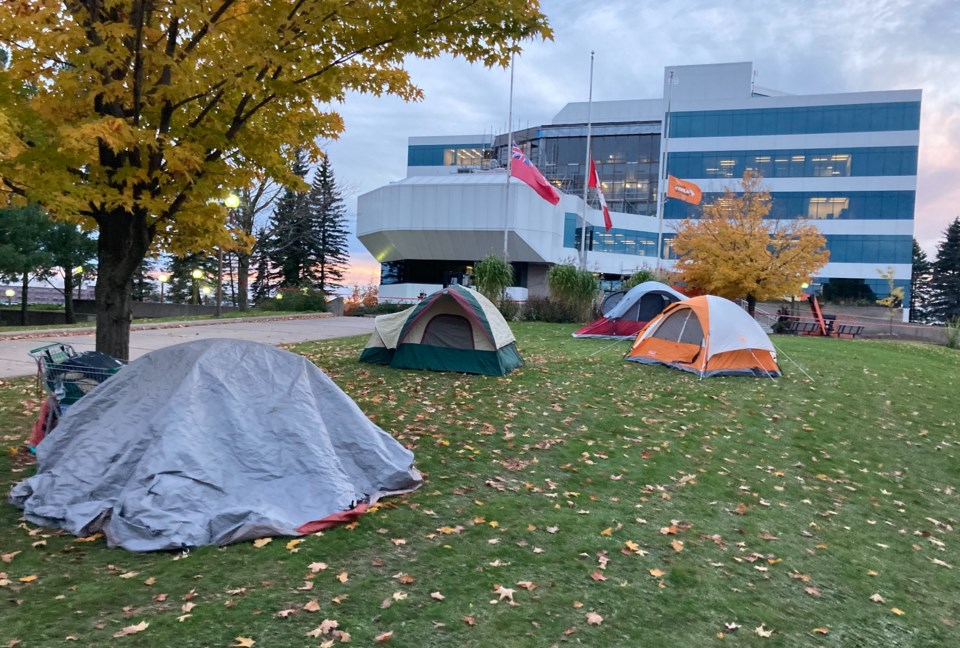Nuala Kenny, who used to run the City of Sault Ste. Marie's legal department and now serves as executive director of Algoma Community Legal Clinic, is warning city councillors they'll have a court battle on their hands if they try to outlaw homeless encampments.
As SooToday reported exclusively last week, a list of supposed 'housekeeping' amendments to city bylaws to be presented to city council tonight adds the following to nighttime restrictions at city parks:
"Despite the above and unless signed by the city to the contrary, no park shall be used for camping or living accommodations at any time."
"The proposed bylaw amendments to the parks bylaw are required to ensure that parklands are safeguarded from use as encampments," the city's legal staff say in a report to Mayor Shoemaker and councillors.
The proposed ban on tent cities was tucked into a list of 'housekeeping' changes, largely comprised of substituting 'their' for pronouns like 'his' or 'her.'
In a last-minute e-mail sent just before 3 p.m. today, Kenny warns city council that any such ban would be unconstitutional and a "gross moral conscience violation."
"It is with great solemnity that we are advising, if the bylaw is passed we shall have no option but to appeal," she says.
The following is the full text of her letter to the city:
Good Afternoon
On tonight’s agenda there is a proposed amendment to the Parks Bylaw.
Bylaw 2023-146 amends the Parks Bylaw to prohibit any city park from being used for camping or living accommodations. The accompanying report suggests that this is a “housekeeping” amendment. The report states “The proposed bylaw amendments to the Parks Bylaw are required to ensure that parklands are safeguarded from use as encampment.”
We are writing to all of City Council as an urgent plea to refuse to approve the proposed amendment.
Of greatest concern, the bylaw amendment is illegal.
There are an increasing number of cases, the most recent of which was decided by the Ontario Superior Court in January of this year (please see The Regional Municipality of Waterloo v. Persons Unknown and to be Ascertained, 2023 ONSC 670), all of which impress that bylaws of this nature violate the Canadian Charter of Rights and Freedoms.
Specifically, the courts have held that public property is for the benefit of all members of the public, including those who are unhoused.
The courts have established “the government cannot prohibit certain activities on public property based on its ownership of that property if doing so involves a deprivation of the fundamental human right not to be deprived of the ability to protect one’s own bodily integrity" (please see Victoria (City) v. Adams, 2008 BCSC 1363 [Adams BCSC] at paragraph 131).
In these “encampment” cases, the Constitutional right to life, liberty and security of the person is at issue. The courts have set the ground rules for municipal governments in governing the homeless community.
In essence, enforcement of the proposed bylaw would amount to a deprivation of life, liberty and security of the person as enforcement would mean eviction from the park without any other viable accommodation.
Moreover, the courts have fine tuned the meaning of viable accommodation. It is not sufficient to merely count shelter beds and declare there is an alternate living space. That is to say, the space must meet the diverse needs of the population. People suffering from drug or alcohol addiction are not allowed at some dry shelters. Other people have physical or mental disabilities or family situations that cannot be accommodated in the shelter system. Of greater importance, the shelter space must first be available. A survey of emergency housing conducted this morning revealed the status of availability in Sault Ste. Marie was meagre.
Beyond the legal hurdles created by the proposed bylaw there is a gross moral conscience violation. To prohibit encampments is to criminalize poverty.
The city is committed to providing inclusive and accessible services to the diverse community in Sault Ste. Marie. This service promise is not limited only to those with bulging wallets. On the contrary, the most vulnerable members of our city are arguably the most deserving of inclusive and accessible service. In the words of Mahatma Ghandi “the true measure of any society can be found in how it treats is most vulnerable members."
We are living at an historic time – a time when real poverty is seeping into every corner of every community. It cannot be legislated away. The answers will only be borne of compassion, collaboration and kindness. Please choose to be on the right side of history.
At the Algoma Community Legal Clinic we are committed to providing free legal advice and representation to the most vulnerable sector of the community. A great portion of our casework focuses on housing. We were actively involved with the city's planing department to discuss homelessness and housing issues.
We did not have the opportunity to discuss the proposed bylaw. We have valuable and expert information on this most critical and complex issue. If the bylaw is deferred we would welcome the chance to talk with city staff and provide comments on the proposed bylaw.
We believe that poverty is a community issue. All citizens, elected officials, business leaders, social service agencies and developers have an obligation to work in concert to address poverty, eliminate homelessness and ensure a safe and dignified place for all to live.
To that end, we aspire to work jointly with social services agencies and the city. We believe that by so doing, those without homes are provided the best possible chance at survival. As such, it is with great solemnity that we are advising, if the bylaw is passed we shall have no option but to appeal.
Representatives from our clinic shall be in attendance this evening.
Thank you.
